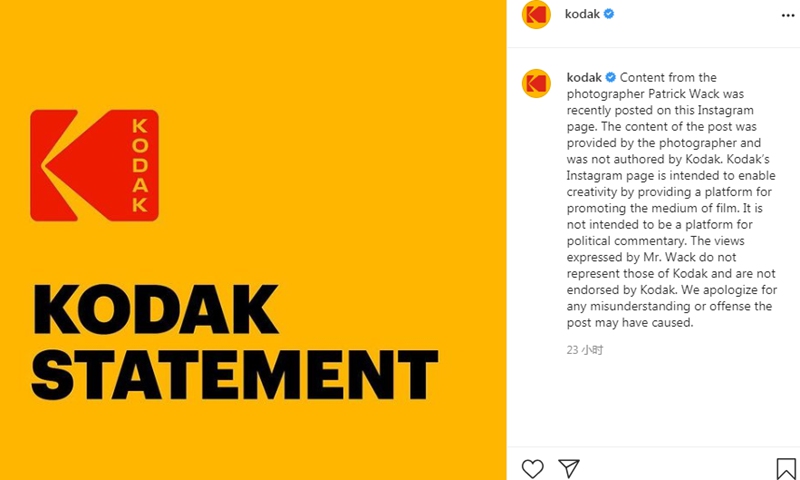
The apology by Kodak on Instagram on Tuesday. Photo: a screenshot of the statement on Instagrm
Kodak apologized on Tuesday for posting photos of Northwest China's Xinjiang Uygur Autonomous Region on Instagram with description that says Xinjiang is under "acute repression."
The photos were shot by Patrick Wack, a French photographer who has spent over a decade in China and visited Xinjiang several times.
His photos show normal life and the beautiful landscapes of Xinjiang. However, in the post released by Kodak along with the photos, it said that a "mass arbitrary detention system [is] being set up in the region," adding that the work "is a testimony to its [Xinjiang's] abrupt descent into an Orwellian dystopia."
Kodak appeared to have deleted the photos from its account after strong criticism from Chinese netizens.
"The content of the post was provided by the photographer and was not authored by Kodak," Kodak said in a statement on Instagram on Tuesday. It also said that "Kodak's Instagram page is intended to enable creativity by providing a platform for promoting the medium of film. It is not intended to be a platform for political commentary."
"We apologize for any misunderstanding or offense the post may have caused," the statement read.
"For a long time, Kodak has maintained a good relationship with the Chinese government and has been in close cooperation with various government departments. We will continue to respect the Chinese government and the Chinese law," said another statement issued by Kodak on its Chinese WeChat account at 8 pm.
Experts reached by the Global Times said that Western countries, including their media organizations and individuals, have formed a stereotype about Xinjiang. To cater to the Western demand to demonize Xinjiang, some companies and individuals would ride on the wave of Xinjiang to gain publicity and make a profit.
Wack's photos, published in a collection called Dust, hit the shelves recently, and all the photos re-tweeted by Kodak's official account were from the book.
Wack's works generally only get a few hundred likes on Instagram. However, after relating the post with the Xinjiang issue and the repost by Kodak, the photos suddenly received tens of thousands of likes, local media Shanghai Observer reported on Sunday.
"Although the photographer has lived in China for many years, his circle of life and the space for his career development are still in the Western world, so it's not uncommon that he would cater to the mainstream voice of Western countries," Cao Wei, an expert at Lanzhou University, told the Global Times on Tuesday.
"Many enterprises and individuals in this 'gray area,' knowing that there are no such things as forced labor and concentration camps, still try to engage in some speculative activities just to show their political stand or for their commercial interests," Cao said.
"Companies should know that Xinjiang-related issues are the bottom line of China, and for those who cross the line, we should use the law to defend our rights, " Cao noted.
Greater China is a very important part of Kodak's seven regions around the world. It has two factories in China, located in Shanghai and Xiamen in East China's Fujian, and more than 70 percent of the products made in those factories are exported.




